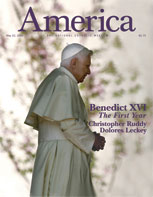Ruling on the Latest Benedict
 The new issue of America magazine features two excellent articles on Benedict XVI by two of my favorite theologian-types, Chris Ruddy and Dolores Leckey. Definitely worth checking out!
The new issue of America magazine features two excellent articles on Benedict XVI by two of my favorite theologian-types, Chris Ruddy and Dolores Leckey. Definitely worth checking out!In "Pope and Abbot" Ruddy writes:
If Christ is the substance of Benedict’s pontificate, listening is its style. The first word of the Benedictine rule is “Listen,” and as the pope said in his installation homily, “My real program of governance is not to do my own will, not to pursue my own ideas, but to listen, together with the whole church, to the word and the will of the Lord.” The Rule extends this call in a specific way to the abbot, who is to listen first to Christ, but also to the entire community, even—or especially—to its most junior members, “for the Lord often reveals what is better to the younger.” The abbot, like all monks, must listen with “the ear of the heart,” with his deepest being, to all through whom God speaks. It is telling, as John Allen reports in The Rise of Benedict XVI, that during the papal interregnum several cardinals felt that then-Cardinal Ratzinger heard them with a depth and familiarity that surpassed that of his predecessor.
While still a cardinal, the pope commended in the book-length interview published as God and the World the centrality of listening in Benedictine life. And as pope he has continued this emphasis in his reflections on the papal office. Last May, on taking possession of the chair of the bishop of Rome—the sign of his teaching authority—he said that the pope is “not an absolute monarch whose thoughts and desires are law. On the contrary: the pope’s ministry is a guarantee of obedience to Christ and to his word. He must not proclaim his own ideas, but rather constantly bind himself and the church to obedience to God’s word.” Obedience, it should be recalled, means “listening.”
and Leckey's wonderful, more personal essay, "The Ordinary Way of Benedict" is an excellent complement to Ruddy's piece:
Every evening in my neighborhood park, the homeless of Arlington are fed from the back of a station wagon. A coalition of Christian churches enacts this work of mercy because, for whatever reasons, there are still people who remain on the streets. Across from that park is St. George’s Episcopal Church, where for 30 years a food pantry has operated. It is like a small grocery store. Five days a week, for two hours at midday, “clients” come for a supply of easily prepared food. I’ve been volunteering there once a month for the past year and a half. Last week I witnessed something new. A man collected his canned goods and then turned to my volunteer partner, who was standing by the door. He looked at us and said, “I need something else. I need a blessing.” Raima and I, two lay women (she a member of St. George’s and I a Catholic) paused. Then Raima asked him what kind of blessing he needed. “I need courage and strength,” he replied. Raima took his hands as two other clients stood perfectly still, sensing something different was at hand. I closed my eyes while prayer poured out of Raima for this imago Dei. He thanked her, he thanked me and quietly left, and we went on with our duties.
Raima and I talked about the blessing as we closed the pantry for the day. We noted that religious conversation rarely, if ever, occurs. She said she had never “blessed” anyone before. No matter. I witnessed that day caritas in action made possible by a humble openness to the Spirit. It reminded me that we all need blessings. I have a home, food, friends, meaningful work, a close and loving family, health. And yet, like that man, I too need something else. What might that be? “Love is the light—and in the end the only light...that can give us the courage needed to keep living and working,” writes Benedict (No. 39). Courage, indeed. I believe that. I also believe that St. Paul is dead right. Love never ends, and, as Benedict points out, it is all encompassing, from eros to agape.
Clearly what I am learning from Pope Benedict XVI is deeply personal. Yet the most personal encounters can and do move one from particular concrete experience to universal truth. It happens in poetry, in narrative theology and quintessentially in the Eucharist. And it happens in the witness of life, whether that be a pope’s life or that of a man without a home.






1 Comments:
“I need something else. I need a blessing.”
Me too! Thanks for the great post.
Post a Comment
<< Home